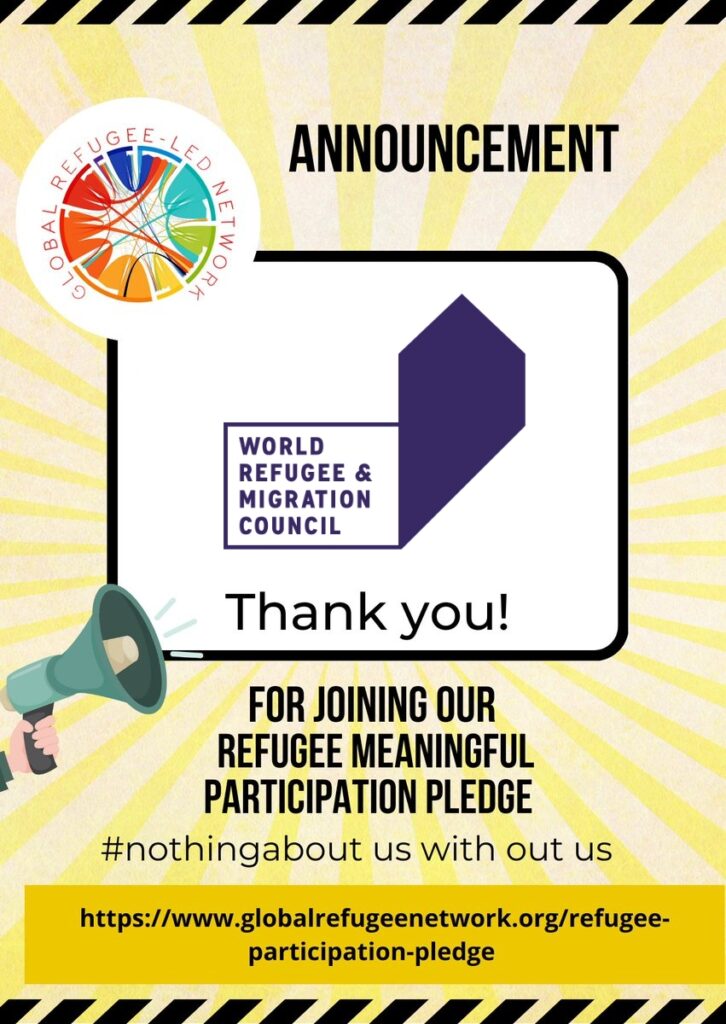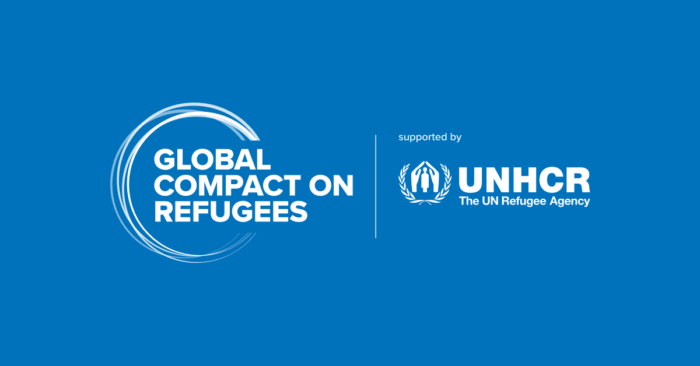The World Refugee & Migration Council supports two important initiatives launched during the 2023 Global Refugee Forum: the Joint Refugee Statement and the Multi-Stakeholder Meaningful Refugee Participation Pledge, led by the Global Refugee-Led Network (GRN).
The Council’s 2019 A Call to Action report noted that global refugee governance processes were failing to facilitate meaningful dialogue and participation that could help to ensure that refugees’ diverse needs are met and their unique contributions realized. The Council called on national governments and international actors to find effective mechanisms for ensure the active and meaningful participation of refugees — especially young people and women — and other affected communities in decision-making processes.
The GRN — which includes the leadership of co-founders of our refugee-led partner organization Global Independent Refugee Women Leaders (GIRWL) Shaza Alrihawi, Anila Noor, and Najeeba Wazefadost and many others — noted five much-needed commitments from the international community:
- Move beyond ad hoc approaches and expand and systematize meaningful refugee participation.
- Increase direct funding to refugee-led organizations to promote refugee self-reliance and advance equitable partnerships.
- Establish pathways to forms of regularized status in countries of asylum, clearly distinguished from local integration as a durable solution.
- End the detention of asylum seekers, externalization of asylum obligations, and forced returns.
- Review and implement changes in existing restrictions on domestic and international mobility for migrants that are hampering refugee self-reliance.
Read the full pledge and the statement below.
“If we want humanitarian and development systems that alleviate the pressures on host governments, have sustainable outcomes and increases refugee self-reliance, all stakeholders must make decisions with refugee experts at that table. It is our shared responsibility that the Global Compact on Refugees objectives become tangible actions, that the rights and dignity of displaced and stateless persons are upheld, and that displacement is a temporary challenge, not a permanent condition.”
— Joint Refugee Statement @ Global Refugee Forum 2023
Refugee Participation Pledge

“In accordance with the commitments established under goal 6 of the Grand Bargain to support a ‘Participation Revolution’; we pledge to support the meaningful participation of refugees and host communities in decisions that affect their lives. Participation should take into account the diversity within communities, including age, gender, and disability. This pledge will support the agency of those we seek to assist while improving the relevance, quality, transparency, and accountability of that assistance. We furthermore commit to share experiences on the implementation of this pledge at subsequent Global Refugee Forums and/or high-level officials’ meetings.”
Joint Refugee Statement
UNHCR Advisory Board of organizations led by forcibly displaced and stateless persons
In the spirit of solidarity and shared responsibility, we, the representatives of the UNHCR Advisory Board of Organizations led by forcibly displaced and stateless persons, stand before you today, to share the voices, hopes, demands, and will of refugees from all corners of the world.
This statement was developed via consultations with refugee-led organizations and individuals with lived experience to ensure the diversity of voices.
Our mission is to advocate for tangible change. We want change led by displaced and stateless persons, to secure our rightful place in the decision-making processes that impact our lives, ensuring that governments, donors, humanitarian actors, and those with the power take concrete steps to address conflicts, human rights violations, the impact of climate change, and hostility towards displaced people.
The Global Compact on Refugees (GCR) aims to alleviate the burden on host countries and empower forcibly displaced and stateless people. We urge governments to fortify international agreements and national laws that guarantee safety, legal protection, inclusion in national systems, and integration for all forcibly displaced individuals. Host governments must reinforce policies that uphold non-refoulement and commit to an environment characterized by respect to protect individuals from exploitation and violence.We need to work together to achieve self-reliance, recognizing that social inclusion benefits not only those displaced but host communities and countries.
States should continue to explore, pilot, and implement established and innovative safe pathways to asylum and durable solutions through humanitarian visas, private sponsorship, resettlement, labor mobility, scholarships, and local integration.
We advocate for cooperation to address the causes of forced displacement, to stabilize regions prone to mass displacement, and actively mitigate the impacts of these crises. However, addressing the root causes does not always result in voluntary return for all displaced people. We need to acknowledge the challenges for some groups in returning to their countries of origin, including re-triggering of past traumas, social and economic exclusion, as well as life-threatening circumstances faced by individuals from marginalized groups, such as the LGBTIQ+ community and specific ethnic and religious minorities. The well-being and safety of all refugees must be considered before encouraging any form of return.
To accomplish the GCR objectives, we must stop viewing forcibly displaced and stateless persons as a monolithic group. We implore you to see us first and foremost as human beings with unique identities, needs, and diverse backgrounds and then work together to develop a range of tailored approaches as opposed to a one-size-fits-all strategy.
This tailored approach must consider the unique and diverse needs, aspirations and capacities of women, indigenous people, LGBTIQ+ people, people with disabilities, older individuals, and young children, along with their caregivers and should be done, together with communities and organizations to:
- Ensure equitable and safe access to housing, education, healthcare, and economic prospects as the top priority.
- Create inclusive environments, with specialized services if needed that consider the legal and psychosocial support needs of vulnerable groups.
- Implement culturally sensitive programs with language support.
Collectively, these actions ensure the fundamental rights and well-being of displaced populations while recognizing their unique characteristics and protection risks with cultural sensitivity.
Finally, we need more meaningful refugee leadership. Since the GRF in 2019 there has been a rise in participation of displaced people in strategic dialogues and the development of global policies and guidance. This includes:
- The creation of the UNHCR Advisory Board of Organizations led by Forcibly Displaced and Stateless Persons with 16 refugee, IDP, and stateless-led organizations to advise UNHCR on meaningful participation,
- Engaging refugees in GCR and developing GRF multi-stakeholder pledges. Not only are we more than 100 refugee leaders and at least 66 refugee led organizations, a significant increase from 2019, but 20 multi-stakeholder pledges also benefitted from refugee experts’ and RLOs’ expertise and knowledge.
- The inclusion of refugees in delegations of Member States, INGOs, and other stakeholders that is bringing together more than 300 participants with lived experience of forced displacement and statelessness together for the GRF.
Despite this progress, we need to acknowledge that evidence-based research shows the humanitarian system is not giving decision-making power to the displaced community, and we still have a considerable distance to go before we realize genuine refugee leadership capable of driving substantial change.
This includes a central role for forcibly displaced and stateless people in decisions around humanitarian response plans, funding priorities, and policies and then meaningful engagement throughout the implementation life cycle of those plans and policies.
There is also an urgent need to increase the quantity and quality of funding for refugee led organizations and community-led initiatives. These resources should be managed by refugees for sustainable and effective outcomes as our professional expertise, acquired knowledge, and lived experiences bring invaluable and unique perspectives to the table.
As UNHCR’s Advisory Board, we commit to advocate for the rights of all forcibly displaced and stateless communities and hold UNHCR and all other stakeholders accountable to the Global Compact on Refugees, especially commitments to the comprehensive responses, meaningful participation of forcibly displaced and stateless persons, and localisation efforts.
If we want humanitarian and development systems that alleviate the pressures on host governments, have sustainable outcomes and increases refugee self-reliance, all stakeholders must make decisions with refugee experts at that table. It is our shared responsibility that the GCR objectives become tangible actions, that the rights and dignity of displaced and stateless persons are upheld, and that displacement is a temporary challenge, not a permanent condition.
